Princes 2 Kings—creating new opportunities for young men of color
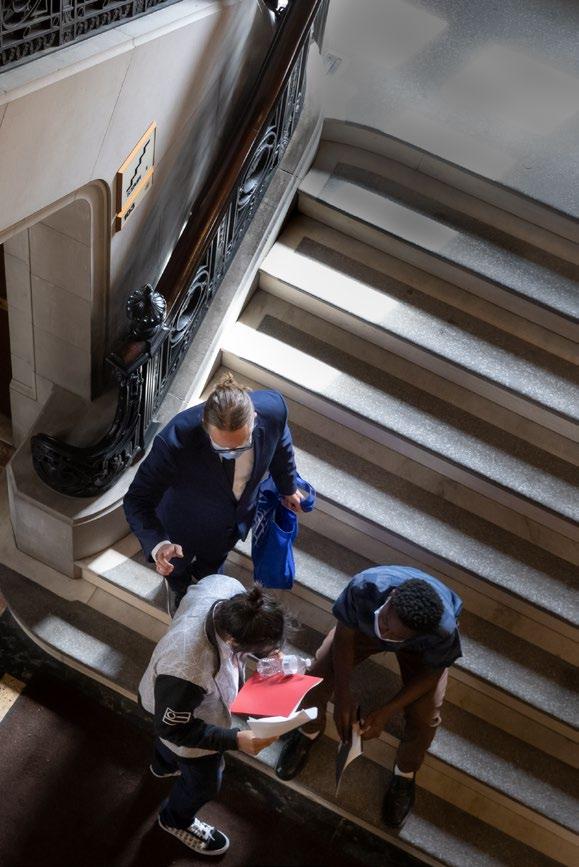
WINTER
2023
16
PAGE
The Rhode Island Foundation is a proactive community and philanthropic leader dedicated to meeting the needs of the people of Rhode Island.
8
How big the little things are In Newport County, one fund changes many aspects of the community
by Adrian Bonéy
Opening doors and minds for young men of color
Princes 2 Kings takes a creative approach to expanding opportunities by Jennifer
Pereira
The road to equity is long — we will get there one step at a time The Foundation’s Equity Leadership Initiative sees success in its inaugural year by Angie
Ankoma
For her, there’s no time like the present to help Deborah DeBare’s donor-advised fund acts as a tool for change
by Daniel Kertzner
Help where it’s needed, when it’s needed
An innovative program is changing lives for some of Providence’s neediest people
by Inés Merchán and Zachary Nieder
Building the next generation of financial leaders
Danny Bullock of Dream Builders Financial Services is reshaping the industry by Bridget Baratta
3 IN THIS ISSUE
26 32
16 20 24
Rhode Island Foundation, through the Clean Competition Fund grant program, has been supporting the Rhode Island Interscholastic Leagues’ Operation Clean Competition program and its partner the Taylor Hooton Foundation since 2013.
In 2004, the suicide of a 17-year-old Texas baseball pitcher left a community devastated. It was soon revealed that the teenager had been using anabolic steroids to enhance his performance. As a response, the Taylor Hooton Foundation (THF) was formed, and is now the leader in educating youth, parents, and coaches about the dangers of anabolic-androgenic steroids, human growth hormones, and other appearance and performance-enhancing drugs.

4
The Rhode Island Interscholastic League and it’s partner THF have been driving awareness at schools like North Kingstown High for years. Before a game at the Wheeler School, Julie Maguire, the North Kingstown High School physical education department chair and varsity field hockey coach shares the following:
“With social media and the internet, there are so many opportunities for young people to get introduced to stuff that is bad for them.” She goes on to say that girls in general are at high risk, with teen girls being the fastest-growing user group of anabolic steroids.

5
Dear Friends,
As we continue to meet the challenges in front of us, we’ve welcomed 2023 with purpose and optimism at the Rhode Island Foundation—inspired by the generosity that our donors have displayed over the past year and by the tireless work of our nonprofit partners and stakeholders.
It is our hope that you’ll come away from reading this issue of our twice—yearly magazine with renewed optimism and inspiration as well. One of the things I’ve learned in my 15 years leading the state’s most significant funder of nonprofit organizations is that we actually can be many things both to, and for, many Rhode Islanders. At times, that means supporting a bustling community kitchen in Little Compton or a renowned theater company in Newport. It also means funding programs that open doors for young men of color and working with partners downcity to provide help to folks experiencing homelessness and behavioral health challenges. And it means reflecting on the impact of the Equity Leadership Initiative and honoring outstanding community servants, none of which we would be able to do without trusting, thoughtful donors and professional advisors like those you’ll read about on the pages that follow.
This issue of Giving Changes Everything aims to showcase the Foundation’s ability to facilitate and steward donor dollars responsibly, while building lasting relationships and partnerships, all with a singular, uniting purpose in mind—to meet the needs of all Rhode Islanders.
We hope that 2023 is treating you well, we remain grateful for your partnership and we look forward to what the future holds.
All the best,

February 2023
6
As we continue to meet the challenges in front of us, we’ve welcomed 2023 with purpose and optimism at the Rhode Island Foundation—inspired by the generosity that our donors have displayed over the past year and by the tireless work of our nonprofit partners and stakeholders.
7
How big the little things are
In Newport County, one fund changes many aspects of the community
By Adrian Bonéy, grant programs officer
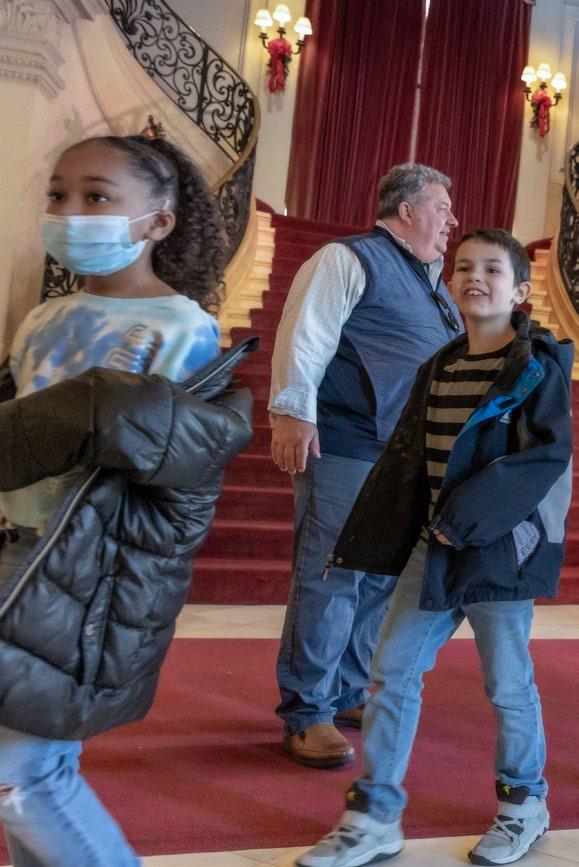
8
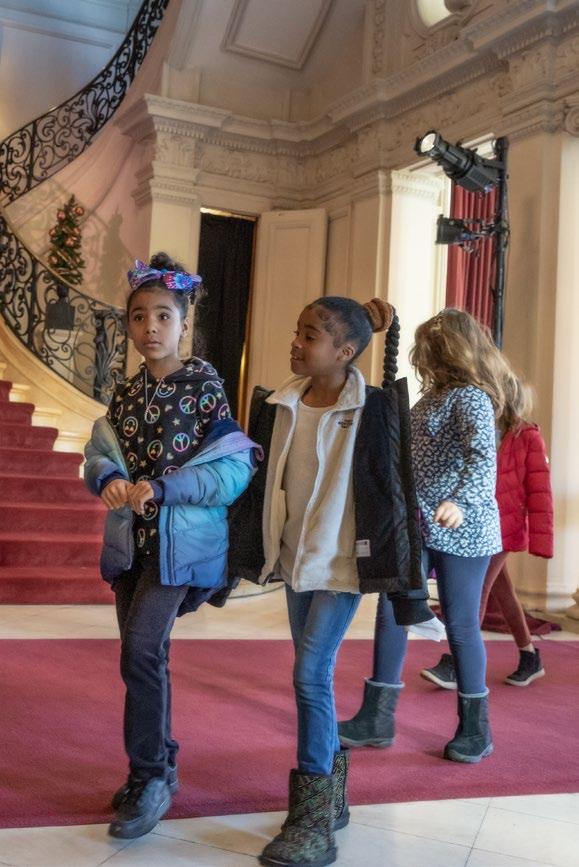
9
A safe place for families in need of shelter. Accessible education and career training. The promise of a warm meal.
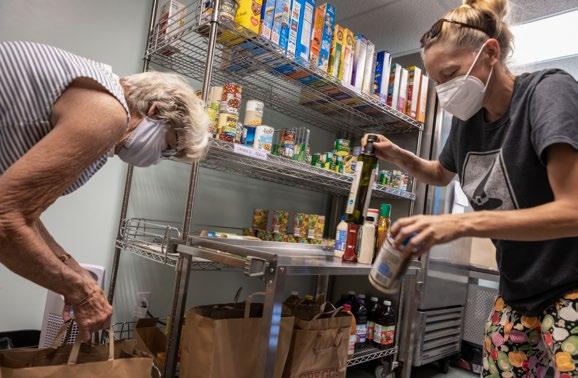
These basic resources help keep vulnerable communities afloat. For over two decades, the Newport County Fund (NCF) has supported nonprofit organizations that work tirelessly to do just that. Serving the six areas that make up Newport County—Jamestown, Little Compton, Middletown, Newport, Portsmouth, and Tiverton—the Fund offers micro-grants of up to $10,000 where even a relatively small amount of money can be of significant assistance.
A group of Newport County residents work with the Foundation to recommend which organizations are most in need of support. Grants fund activities ranging from emergency housing and distance learning to job training and food pantries. Over the years, the Fund has invested nearly $5 million in programs and services for residents of Newport County.
10
How big the little things are
The power of choice
“Hi Eli, looking for some food today?” A woman calls out as a young man walks through the door. Eli is a regular at the Jamestown Community Food Pantry where clients make appointments to ensure personal attention and support. Today, he’s technically a walk-in, but they won’t turn anyone away. He has no transportation so the Pantry delivers his groceries to him.
“Do you want cheese or cold cuts?
There’s yogurt.
And there are fresh herbs on the bottom there.
Here, have a few tomatoes and some garlic.”
This kind of dialogue is common at the Pantry, which operates under the “client choice” model. This model has been proven to reduce waste, as families are more likely to eat foods that they choose and know how to prepare—chicken, meats, fish, and hot dogs, as well as breads, dry and canned goods. Fresh fruits and vegetables come from local farms and gardens, including from the Jamestown Community Farm.
“We don’t participate in the state food bank so it allows us to be more flexible. Volunteers do the shopping, filling the shelves with what our community needs and wants,” says Deb Nordstrom, co-manager and president of the board.
Elizabeth Bentley started using the pantry during the COVID-19 pandemic. “I had lost
three jobs—I work in restaurants right on the island—during the pandemic, everything shut down and I just couldn’t keep up.” Elizabeth, 45, has three daughters, two—ages 9 and 17—still living at home. “The pantry is so well-stocked. I have a daughter who is lactose intolerant, and they even stock lactose-free products for us.”
The Jamestown Community Food Pantry serves individuals, families, the young, and the elderly throughout the Jamestown community. As an all-volunteer organization—including management, planning, fundraising, and outreach—all donations and contributions are dedicated to supporting the ongoing operations.
11
“Volunteers do the shopping, filling the shelves with what our community needs and wants.”
How big the little things are
A performance to remember
The anticipation in the room is palpable as 140 third-graders from Pell Elementary School descend upon Rosecliff Mansion—excited to watch A Newport Nutcracker at Rosecliff. The second act unfolds in the grand ballroom where the students are transported to the Land of the Sweets.
This experience, and countless others like it, was commissioned by Island Moving Company’s (IMC) Dancing Through Boundaries program. The program includes Arts-First Matinees, often a student’s first experience with live dance performance. The organization received $10,000 from the Newport County Fund to support the initiative, a comprehensive educational program that serves 5,000 students annually across Newport County Schools.
The young audience is buzzing. They listen as a Rosecliff docent fills them in on the history of Rosecliff and its transformations during a
succession of owners. Danielle Genest, artistic director of IMC, gives them a synopsis of the performance and tells them the appropriate etiquette for an audience. As it turns out, the students are a perfect audience—attentive, respectful, and appreciative of all the right moments.
“Our programs use dance as a multi-modal learning strategy,” says Peter Bramante, executive director of IMC. “They provide arts and cultural enrichment, alternative methods for improving students’ physical and emotional well-being, and access to dance training.”
Upon its conclusion, the entire cast takes the stage, introducing themselves, and taking questions. “Is it hard? Doesn’t it hurt to stand on your toes? How do you jump so high?” The energy continues as the students file reluctantly back to their buses. The IMC performance has clearly made an impression.
Jamestown Community Food Pantry: first grant in 2020, total granted
$29,470
Island Moving Company: first grant 2005, total granted $91,920
Little Compton Community Center: first grant 2004, total granted $77,980
12
The support of the Rhode Island Foundation through its Newport County Fund has made an impression on these three organizations.
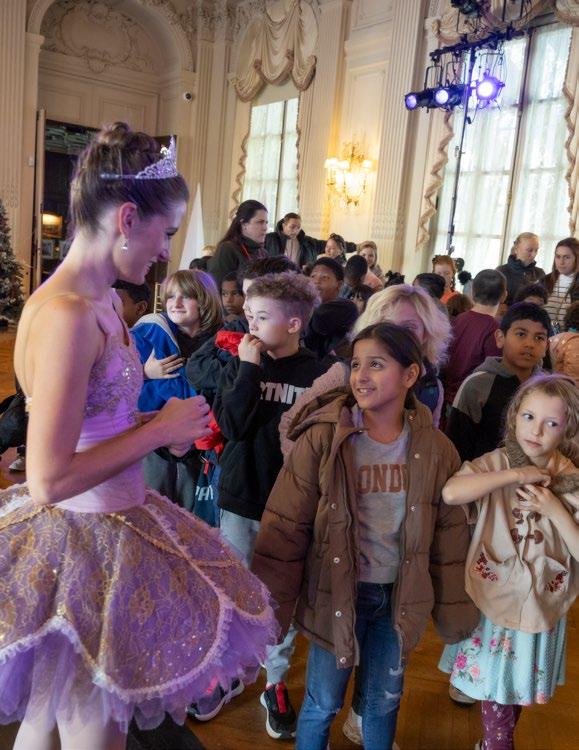
13
How big the little things are
A bustling kitchen with community on the menu
The year was 1992 and it was all but decided: Little Compton’s 100-year-old Grange building would be demolished. That was until a group of volunteers decided to band together and successfully raise $350,000 to save the institution.
Five years later, Little Compton Community Center—the first and only in the community—opened to the public. The demand for programs and services quickly exceeded expectations, and within months, the organization had transformed from an empty building into a bustling center of activity.
In recent years, a big part of that activity has been the Center’s burgeoning Senior Lunch Program. While the longstanding program had always been popular, it began to grow exponentially with the onset of COVID-19—the number of meals went from 60 to 130 per week for home delivery or pick-up. When the pandemic restrictions were lifted, the center returned to also serving meals in their dining room, allowing their senior clients to socialize again. In 2022, the program received a $10,000 grant from the Newport County Fund.
The grant has helped make vast operational improvements, including hiring Chef Dave, who came with an extensive culinary resume and has taken the cuisine to a whole new level. On a recent visit to the Center, guests trickled in early to a pleasing aroma wafting through the dining room from the small kitchen. Chef Dave, assisted by kitchen volunteers, was preparing the Shrimp Étouffée with rice that would be served that day. For almost 25 years, the Center
served meals prepared and delivered by Meals on Wheels, which typically arrived cold and soggy due to the location of the Center. Now the monthly menu includes entrees like Polish Winter Soup, Eggplant Parmesan, and Stuffed Sole.
Word is out in the community—the Center now serves 65-70 meals a day, roughly 200 per week. But as the program’s popularity continues to grow, the Center’s kitchen is struggling to keep up.
“We are faced with some tough decisions, including how to fund an expansion of our kitchen facility. Initially, we’re hoping to get an outdoor walk-in freezer/refrigerator. We currently don’t have the storage to get large deliveries at reduced prices,” says Samantha Snow, communications director.
With 31.5% of Little Compton’s population over age 65—the highest percentage of elderly in the state—the goal of the Senior Lunch Program is to turn no one away.
14
“We are faced with some tough decisions, including how to fund an expansion of our kitchen facility.”
To support programs like these and others, please contact a member of our Development team:

Bridget Baratta, Vice President of Development, bbaratta@rifoundation.org
Pam Tesler Howitt, Senior Philanthropic Advisor, pthowitt@rifoundation.org
Bruce Keeler, Senior Philanthropic Advisor, bkeeler@rifoundation.org
Daniel Kertzner, Senior Philanthropic Advisor, dkertzner@rifoundation.org
Christine Pellegri, Senior Philanthropic Advisor, cpellegri@rifoundation.org
Kelly Riley, Stewardship & Cultivation Officer, kriley@rifoundation.org
15
Opening doors and minds for young men of color
Princes 2 Kings takes a creative approach to expanding opportunities
By Jennifer Pereira, vice president of grants & community investments
A lack of affordable housing was a leading topic in local races this past election season. It’s also why housing advocates and Rhode Islanders facing homelessness pitched tents in protest in front of the State House when the cold weather started to kick in late last year.
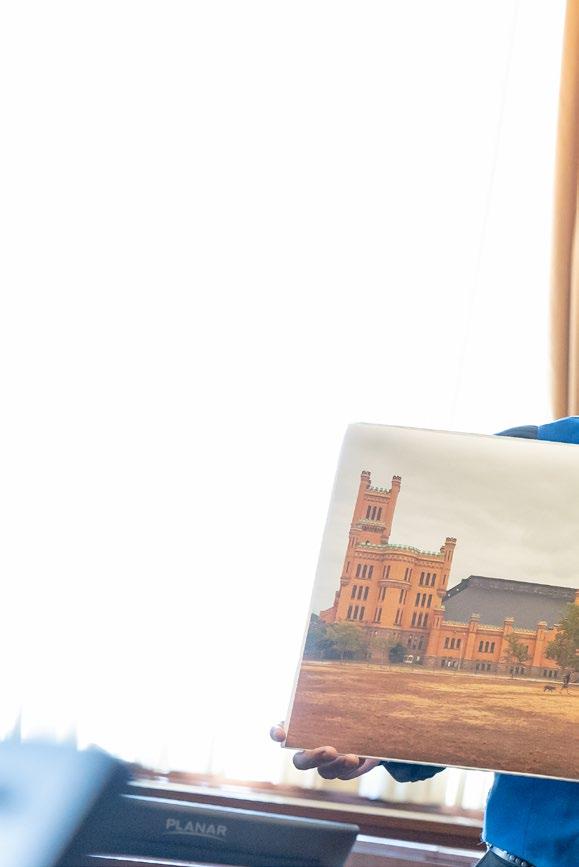
This continues to be a problem nationwide.
The Princes 2 Kings (P2K) youth mentorship program, which has a track record of positively impacting the lives of Black, Brown, and other boys and young men of color since 2012, debated the dilemma before a real judge in Federal Court recently. The mock trial—specifically about the pros and cons to a faux housing development proposal in the historic Cranston Street Armory, in Providence—was one of the latest events in their civil discourse program.
16
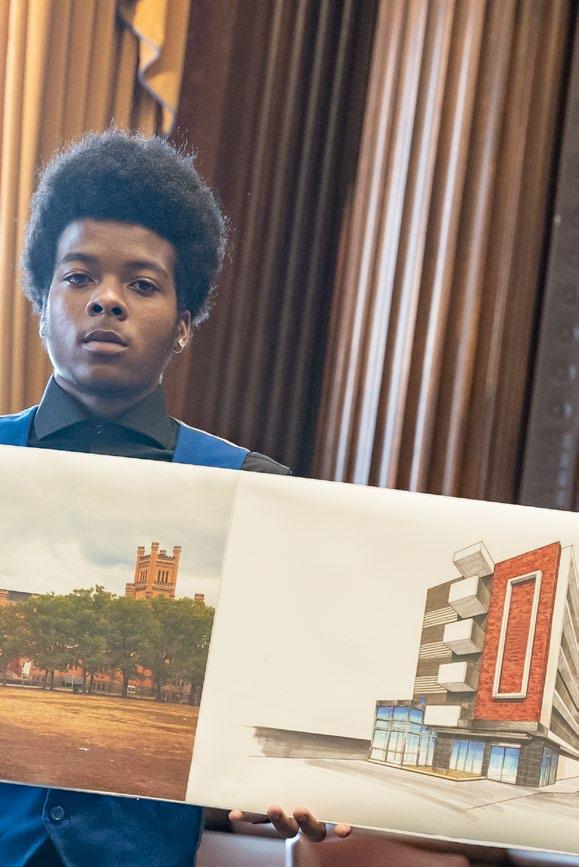
17
“I try to provide exposure to people, places, organizations and careers that they might not engage with in their everyday lives,” said P2K Director Scott Lapham about the overall mission of the now Boys & Girls Clubs of Providence program that is partially funded by a Rhode Island Foundation grant.
P2K was initially funded through a five-year federal grant as a summer program striving to curb school dropout rates and increase the number of students of color attending secondary institutions. Foundation Vice President and Executive Director of the Equity Leadership Initiative, Angie Ankoma, then a co-director within the state Department of Health, managed the program at the state level, while community leader Kobi Dennis served as its director. The Boys & Girls Clubs of Providence and Rhode Island Foundation were among its first supporters.
In his efforts to shape the program into a high quality, year-round program to enable students to interact with P2K longer, Lapham, who worked with and then succeeded Dennis, added, “I’m a White guy taking over an urban program. I’m not a social worker or a shrink or a psychologist. But I understand the value of what a positive, persistent presence can do for youth. The goal is to have kids spend years, not months, with us.”
He said it is the Rhode Island Foundation and Boys & Girls Clubs of Providence that are helping to make it possible to establish a culture where the participants want to stay.
To also get the buy-in, P2K tailors its various programs, tours, and speakers to tie into issues that may directly affect the participants’ neighborhoods. One of their latest projects, Metal Lab, for example, has the students learning metal fabrication skills (welding, cutting, and grinding) while transforming disabled firearms into sculptures that talk about how students feel about gun violence.
The civil discourse program, which started in 2017, started organically when a teacher came to speak to the boys and young men with her husband, who is a lawyer. The talk morphed into a mock trial, learning the phases of a civil trial and even watching the sentencing of a White man—the

opposite, Lapham said, of the stereotype seen on TV—who had been dealing opioids and then talking candidly with the judge afterward.
US District Court Chief Judge John J. McConnell, Jr. also took the group on a tour of the courthouse. “We need more people of color in all levels of the court system top to bottom,” the judge told the P2K students. “If we want a fairer system, we need more diversity.”
The first case was about environmental racism based on a real proposed trash transfer station in the Allens Avenue area where high asthma rates have been found. They did a deep dive into asthma and the emissions at the Port of Providence. The second case was about domestic gun violence and the students learned about the legal and emotional aspects of such violence as well as toxic masculinity, consent, and healthy positive masculinity.
18
For the housing mock trial, P2K students researched the importance of community and the need for more opportunities and resources. They also discovered the high rent averages in Providence, how many hours at a minimum wage job it would take to afford such a place and other realities impacting this nationwide problem.

The participants represented a neighborhood organization or a development corporation. The corporation, who said the project was a benefit to the neighborhood, argued that market rate rent and condo fees were needed, since the building has been underused for so long.
“This project is a win-win for the neighborhood residents and the city as a whole,” the students representing the corporation argued. However, the students representing the neighborhood organization said while the development could be beneficial to the West End,
luxury apartments and condos will increase the rent and housing prices across the neighborhood, creating more stress on already tight budgets.
They proposed at least 40 percent of the housing units be designated below the market prices for rent and condo purchase.
“Creating these opportunities for affordable housing would also increase the likelihood that the new units would be occupied by people who more closely reflect the diversity of the neighborhood,” argued the students representing the organization. “We are simply looking to create balance for the benefit of the people and the culture that has existed in our beloved neighborhood for many decades.”
Whom should the judge rule in favor of?
19
The road to equity is long—we will get there one step at a time
The Foundation’s Equity Leadership Initiative sees success in its inaugural year
By Angie Ankoma, vice president & executive director, Equity Leadership Initiative

20

21
The results are in: Rhode Island Foundation’s Equity Leadership Initiative (ELI) has surpassed expectations. How, you may ask, does one measure the progress of an initiative with goals as ambitious and intangible as the ELI’s? In short—one person at a time.
The goal of the ELI is to cultivate, mentor, and seek access for individuals who identify as Black, Hispanic or Latino, Indigenous, Asian, and multiracial from across sectors to build a pipeline of leaders of color in positions of influence in Rhode Island.

To accomplish this, a cohort of rising leaders meet monthly for a year, with staff readily available for consultation in between meetings. Trainers and presenters help members with their development, and, if requested, leaders are invited to share their work and engage in critical discussion to establish more equitable ways of working. The participants also have coaches to strengthen and strategize their personal growth.
For example, at their November 2022 session, the cohort was vulnerable and supportive as Trainer and Associate Professor Phitsamay Uy took
them through an intercultural identity development exercise.
“This work is hard,” Uy said. “Life is hard. So when you are taking up space, or creating space, you have to take into account that this is a part of our lives in the United States. Why are you surprised I speak English so well? Even as people of color, we cannot assume we share the same experience. How should we act together? How do we see each other?”
Together, they developed and agreed to an accountability pledge of community norms to hold each other to. The norms included: assume positive intent, listen to understand rather than to respond, and lean into conflict to learn.
This is just one piece of a puzzle that has proved to be very effective.
Six of the first cohort members were recognized with awards and distinctions; six received promotions within their organizations; eight have accepted new job offers or have started new businesses. These achievements are invaluable steps toward a more diverse and equitable
22
professional landscape. This first year has taught us that if you intentionally provide the support, network, and resources for leaders to thrive, change happens. Equity doesn’t just happen; we all must actively work to create it.
Time will tell, as the second cohort is already underway.
“We’re speaking with action,” President and CEO Neil Steinberg said. “Money is part of it, it always is, but we have unparalleled influence in different areas, and we want to use it.”
How to leverage the Foundation’s influence is a recurring topic of discussion throughout the year. As executive director of the program, I advised them to fully commit to their journey and be selfish with focusing on their personal development. Throughout the year, trainers challenged the participants to disrupt current systems and eliminate barriers, balance vulnerability with upward mobility, and to treat self-care as a necessity rather than an option.
It was a safe place for them to speak about issues common to leaders of color and how to deal with, combat, or eliminate the obstacles, pitfalls, stress, and trauma sometimes faced daily in predominantly White spaces. The first cohort learned, among other tools, the effectiveness of having a personal brand, the eight rules of healthy racial comeback lines, how to negotiate with a ‘less is more’ speaking strategy, and the five Ds of bystander intervention.
That cohort is now looking at future cohorts as family.
“This is an opportunity like no other,” said Rosedelma Seraphin, assistant director of the Office of Diversity and Multicultural Affairs at The Warren Alpert Medical School of Brown University, as the first cohort compiled advice for the second cohort. “Absorb as much as you can, ask questions and get ready to grow. You will quickly realize the value of your cohort and the liberating magic of holding space for and with these people… You are worthy of this experience, and more so, do not set limitations on what you can have.”
“The Foundation lifted us and promoted us every opportunity they could,” reflected Ana Barraza, a member of the first cohort and interim director of diversity and outreach at Roger Williams University Law School. “I have to applaud my cohort group also. We did a lot to support and promote each other—constantly lifting each other up without competition for attention and space. Rising tides lift all boats.”

23
ELI is a critical program from the Foundation’s $8.5 million investment in 2021—above and beyond existing annual funding—to address racial equity, diversity and inclusion.
The foundation furthered its pledge to ELI at the first cohort’s graduation when Neil Steinberg announced a $2 million commitment to endow the program and solidify its permanence.
For her, there’s no time like the present to help
Deborah DeBare’s donor-advised fund acts as a tool for change
 By Daniel Kertzner, senior philanthropic advisor
By Daniel Kertzner, senior philanthropic advisor
24
After the outrage and aftermath of the murder of George Floyd by a Minnesota police officer, Deborah DeBare was “grateful that I could immediately tap into my fund and help.”
The donor-advised DeBare Family Fund was established by DeBare, a community-servicedriven-lifelong-social-justice advocate, in 2019 and is managed by the Foundation.
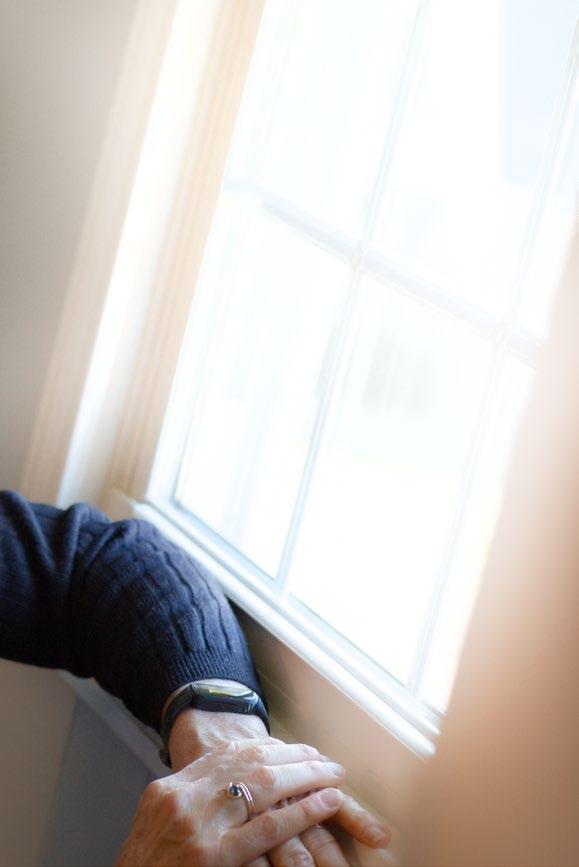
DeBare’s vision was to be able to give small grants to social justice organizations every year. For such organizations and other nonprofits, having unrestricted funds are rare and essential.
“These needs are going to exist well after I am gone,” said DeBare, senior deputy director at the National Network to End Domestic Violence, a national membership organization of state and territorial domestic violence coalitions.
Prior to her current role, she served as the executive director of the Rhode Island Coalition Against Domestic Violence for more than 22 years. Before that, she was executive director of the Domestic Violence Resource Center of South County and worked as a policy specialist at the Rhode Island Department of Mental Health.
DeBare continued, “The fund seemed like a great next step for me and I didn’t want to wait until my 80’s to establish it.”
The Foundation allows DeBare to not have to worry about making good or bad investment decisions, “The fund has risen so much. Which is great, because I want this to be around for years to come.”
It is her hope that her daughter, Mariana, continues in her footsteps, and she already helps DeBare with selecting recipients. They have included small, community-based organizations where “$250 can be precious to them,” said DeBare.
Added DeBare, “I worked my whole life for social justice, and it is an honor to keep doing my part.”
25
Help where it’s needed, when it’s needed
An innovative program is changing lives for some of Providence’s neediest people
 By Inés Merchán, senior grants programs officer, and Zach Nieder, senior strategic initiatives officer
By Inés Merchán, senior grants programs officer, and Zach Nieder, senior strategic initiatives officer
26
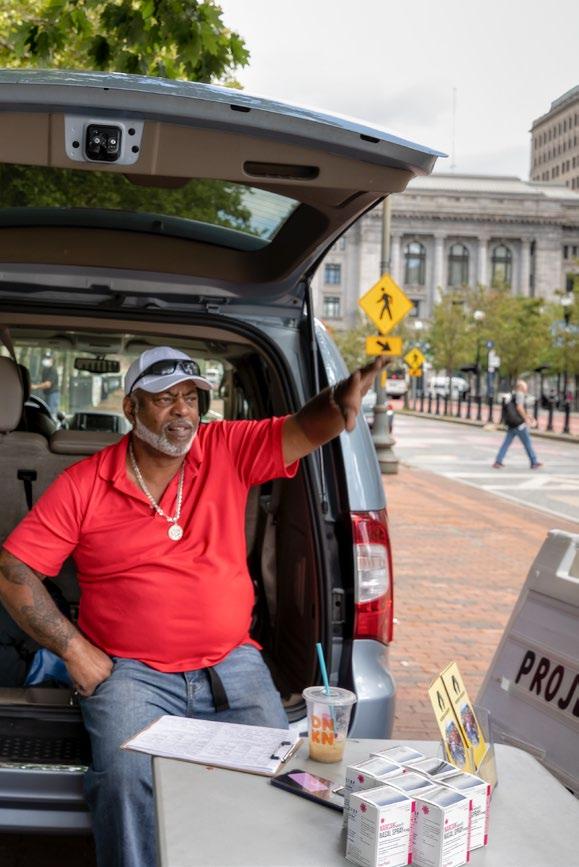
27
Matt Elliott and Braulio Ortiz man a fold-up table in Kennedy Plaza. A regular stream of “customers” come and go. Do you need hygiene products? Narcan? Needles? Braulio makes a note of each visitor on his clipboard. Many are regulars. They stay and chat: where they’re staying, why they haven’t been around, how many weeks (or days) they’ve been clean. Virginia and her dog, Thor, stop by. She tells them she has an apartment now. Christina, who is living on a boat, asks Matt if he has any warm coats.
Matt is in recovery, so he’s dealt with many of the same issues as these folks. He grew up in Fox Point, but in high school, he fell in with a tough crowd and started drinking—and worse. He ended up going down a hard path. “For me, the tipping point was when fentanyl started showing up. Fortunately, I had a family and friends… structure around me to encourage me to get better, to get into detox.…”

Matt and Braulio work for Project Weber/RENEW—a partner in this collaborative homeless outreach initiative that is supported by the Rhode Island Foundation, Crossroads RI (CRI), The Providence Center (TPC), and the Downtown Improvement District Clean + Safe team (DID). This partnership provides behavioral healthcare, substance use treatment, and housing options for people experiencing homelessness who frequent Kennedy Plaza and the downtown area.
This effort was the brainchild of Senator Josh Miller, a downtown business owner for 25 years, chairman of the Downtown Improvement District (DID) and state senator since 2006. He knows that there are many people in and around downtown who are unhoused, challenged by mental health issues and addiction. He believed that the best way to support them was through a social work presence that incorporates as many different perspectives as possible. Josh made a proposal: the DID, in partnership with the Providence Foundation, would raise $200,000 toward the effort and the
28
Rhode Island Foundation would supplement that amount with another $100,000.
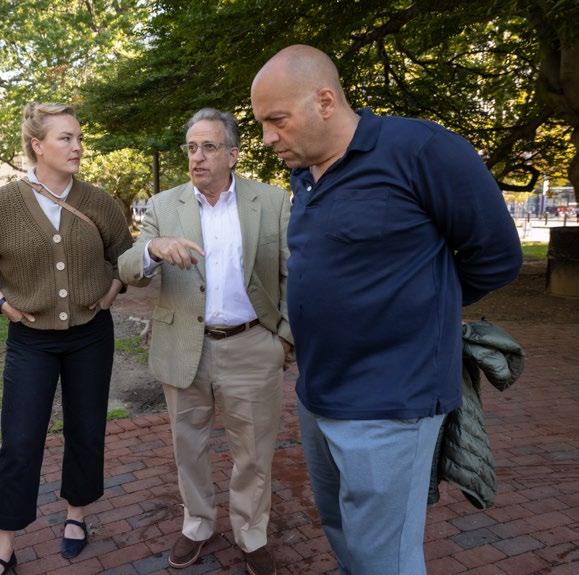
“These are people who have always been in our footprint,” says Josh. “But efforts to address these problems have not always been collaborative. The DID team was not involved before, and yet, these guys know every nook and cranny downtown—they know who is sleeping where and, in many cases, they know their names.”
So, the DID led the charge to raise funds for the program, and expanded their own Block By Block team by doubling the number of Safe Ambassadors on the streets (from five team members to ten), and by increasing their hours by adding four evening hours to their shift starting in November 2021.
29
From March 1, 2022 – July 31, 2022, Project Weber/RENEW has provided the following services in the Providence downtown area served
1,377 unique individuals distributed
1,582 Narcan doses
across
2,599 encounters
1,933 basic needs encounters (food, water, clothing, etc) supported
129 unique individuals with recovery housing
The data so far suggests Josh was right: 41 households have been moved to permanent housing; 20 clients have been referred to the Coordinated Entry System Call Center* and four have entered shelters; while 16 referrals have been made to mental/behavioral health services. Crossroads Mobile Diversion Program, headed by Case Manager Will Blais, has made contact and begun working with 136 living-on-the-streets homeless clients. And finally, The Providence Center has created a fast-pass referral system for clients from Crossroads and Project Weber/ RENEW. So far, The Providence Center has received four referrals.
“People living on the street have often had negative experiences with housing, healthcare, and social service systems,” notes Colleen Daley Ndoye, executive director of Project Weber/ RENEW. The partners in this initiative are working to “rebuild the trust and streamline
transported over
30 clients to substance use detox
33
77% of encounters with people experiencing homelessness funding, paying for 297 weeks of recovery housing
of those are now paying for housing completely on their own
processes to determine more efficient, safe, and respectful ways to ensure that clients are returned to a stable living situation as quickly as possible.”
Back at Kennedy Plaza, Matt Elliott stresses the importance of having a highly visible presence downtown. “Our clients need to know that we are all available—every day. If someone had not been right there to take me to detox when I was ready, I don’t know what would have happened to me.”
*Coordinated Entry is a federal mandate that requires the state’s homeless service providers to integrate their efforts to make it easier for people to access services, identify and prioritize services based on need, and to make sure that people who need help the most get help first.
30

31
Building the next generation of financial leaders
Danny Bullock of Dream Builders
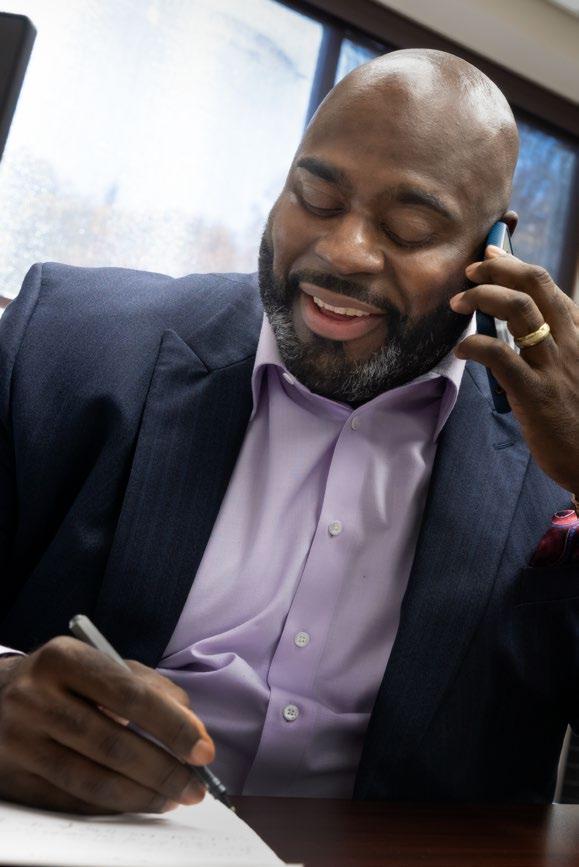
Financial Services is reshaping the industry
By Bridget Baratta, vice president of development
32
Danny Bullock has a vision for the next generation of leaders in the financial services sector.
“At conferences and meetings, I was often the only minority in the room. It was intimidating—I had impostor syndrome,” Danny shared when asked about his early days in the field. African American men are the least represented group in financial services, a stat that Danny would like to see change.
As a mentor to many young Black men in the community, he tries to steer them toward the world of finance. “I let them know that I’m not brilliant—I work hard, I study hard. The biggest aspect of the job is knowing how to communicate with people, and this is what I show Black and Brown young men.”
It’s important to him to help others in a way that creates a legacy—a way for him to make a lasting difference long after he’s gone. He didn’t always know this about himself. It wasn’t until after he left a steady career as the director of security for Brigham and Women’s Hospital in Boston that Danny found his calling within the financial services industry.
His initial financial education came during his first job at John Hancock. But it was only when he worked with an independent financial planner that he really learned the field and started to feel that entrepreneurial impulse. He knew when it was time to venture out on his own.
“There was a particular demographic that I wanted to serve—people like me who are in need of help.” Since much of middle-class America does not have a million dollars to invest, Danny saw a huge demographic not being served by the big financial houses. “I had to be able to call my own shots—I didn’t want to follow a matrix determining who is worth meeting with.”
As a member of Rhode Island Foundation’s Professional Advisory Council (PAC) —which offers insight, counsel, and partnership for charitable planning— Danny would like to see more Black people join the Council. “I don’t want to just go away when my PAC term ends—what can I do next to stay involved with the Foundation and the people I have met here?”
“I help my clients get to their retirement destination while also building the life of their dreams.”
—Danny Bullock
33
Kate Brewster honored with the 2022 Murray Family Prize
When Kate Brewster (third from left) became executive director of the Jonnycake Center for Hope in 2015, she knew there was work to be done. And work she did.

During her tenure, she has helped the South Kingstown-based Center expand its services, helped oversee the renovation of a 120-year old school house into its new headquarters, is updating four multi-unit properties to provide housing to local families, and recently announced the impending launch of a youth center.
In 2021 alone, the organization helped low-income Rhode Islanders obtain $290,000 in income tax refunds, provided $87,000 in emergency financial assistance for food, utilities, and housing; had 6,200 visits to its food pantry and helped 30 households find permanent housing.
“What started as a food pantry and thrift store close to 50 years ago has grown into a robust neighborhood organization. Today, our services are centered around the social determinants of health, including housing, education, economic security, health and wellness, and community,” said Brewster.
It is no surprise that she was awarded the Murray Family Prize for Community Enrichment at the Rhode Island Foundation.
“Kate’s remarkable commitment to serving disadvantaged communities is an inspiring standard for others to follow,” said Paula McNamara, daughter of Terrence and Suzanne Murray, who along with her family established the Prize. With the honor, Brewster received $50,000 in recognition of her dedication to South County residents.
34
Lead. We have earned the trust of our donors, community leaders, and Rhode Islanders through a century of effective investments, strategic grants, and responsible decisions.
Transform. We align our fundraising, grantmaking, and leadership to inspire and engage Rhode Islanders to address today’s challenges and create lasting improvements in our community.
Inspire. We challenge and encourage Rhode Islanders to become active and involved in the community, to form meaningful partnerships, and to work together for the good of Rhode Island.
One Union Station
Providence, RI 02903
ADDRESS SERVICE REQUESTED

DESIGN: NAIL
PHOTOGRAPHY: CONNIE GROSCH
PRINTING: MERIDIAN PRINTING
EDITORIAL STAFF: ARIANNE CORRENTE, CONNIE GROSCH, ALISHA PINA, LAUREN PAOLA

















 By Daniel Kertzner, senior philanthropic advisor
By Daniel Kertzner, senior philanthropic advisor

 By Inés Merchán, senior grants programs officer, and Zach Nieder, senior strategic initiatives officer
By Inés Merchán, senior grants programs officer, and Zach Nieder, senior strategic initiatives officer







